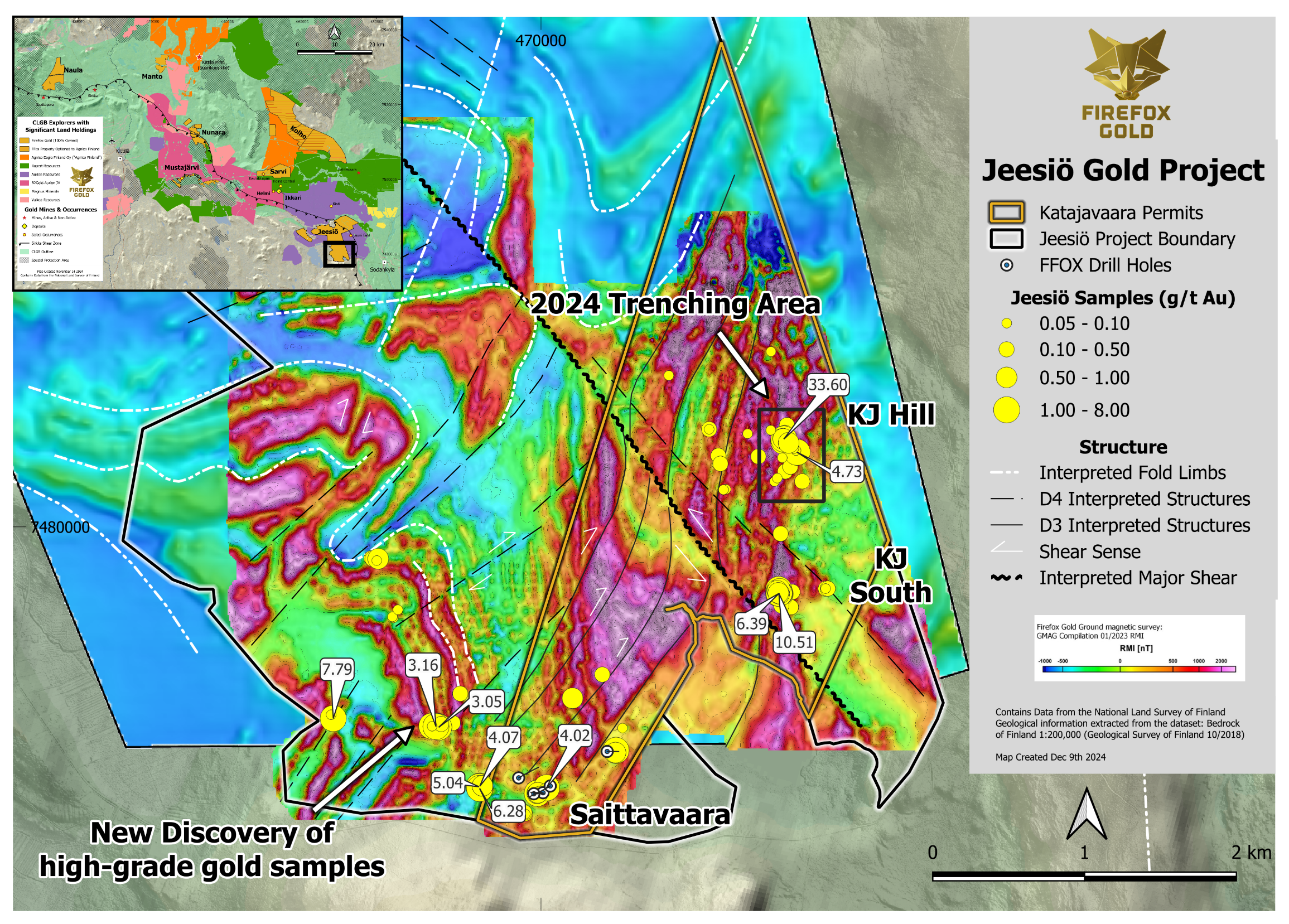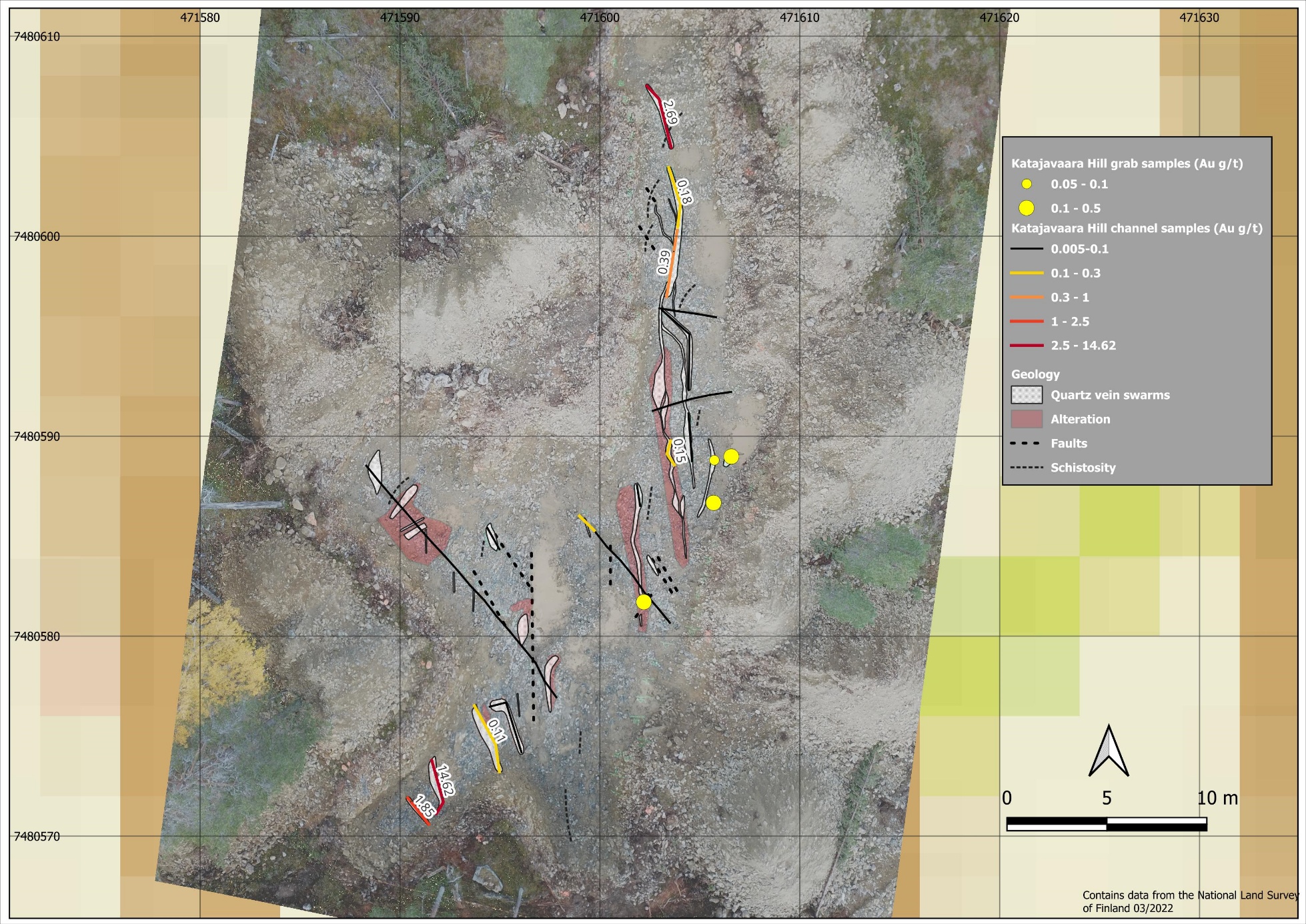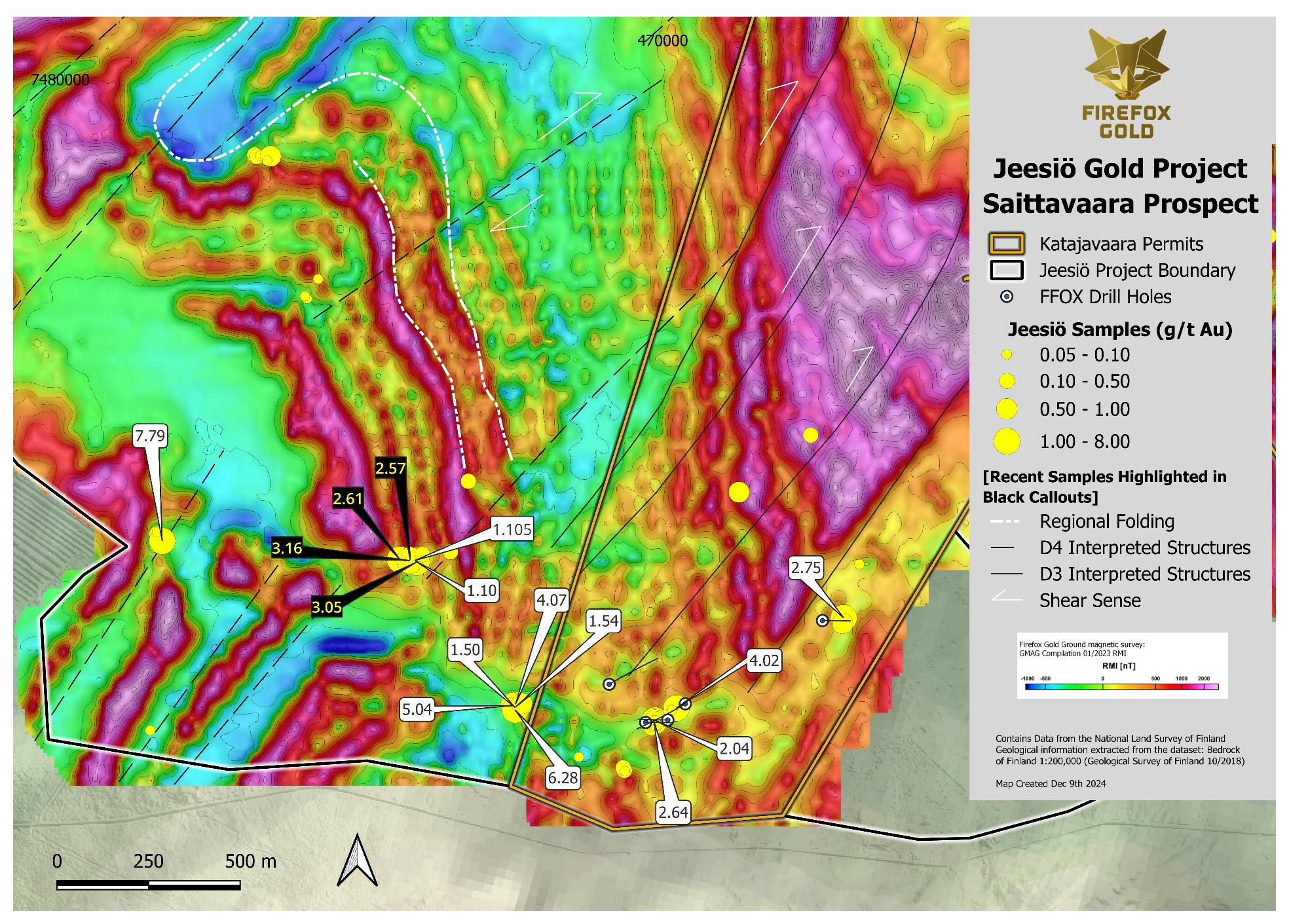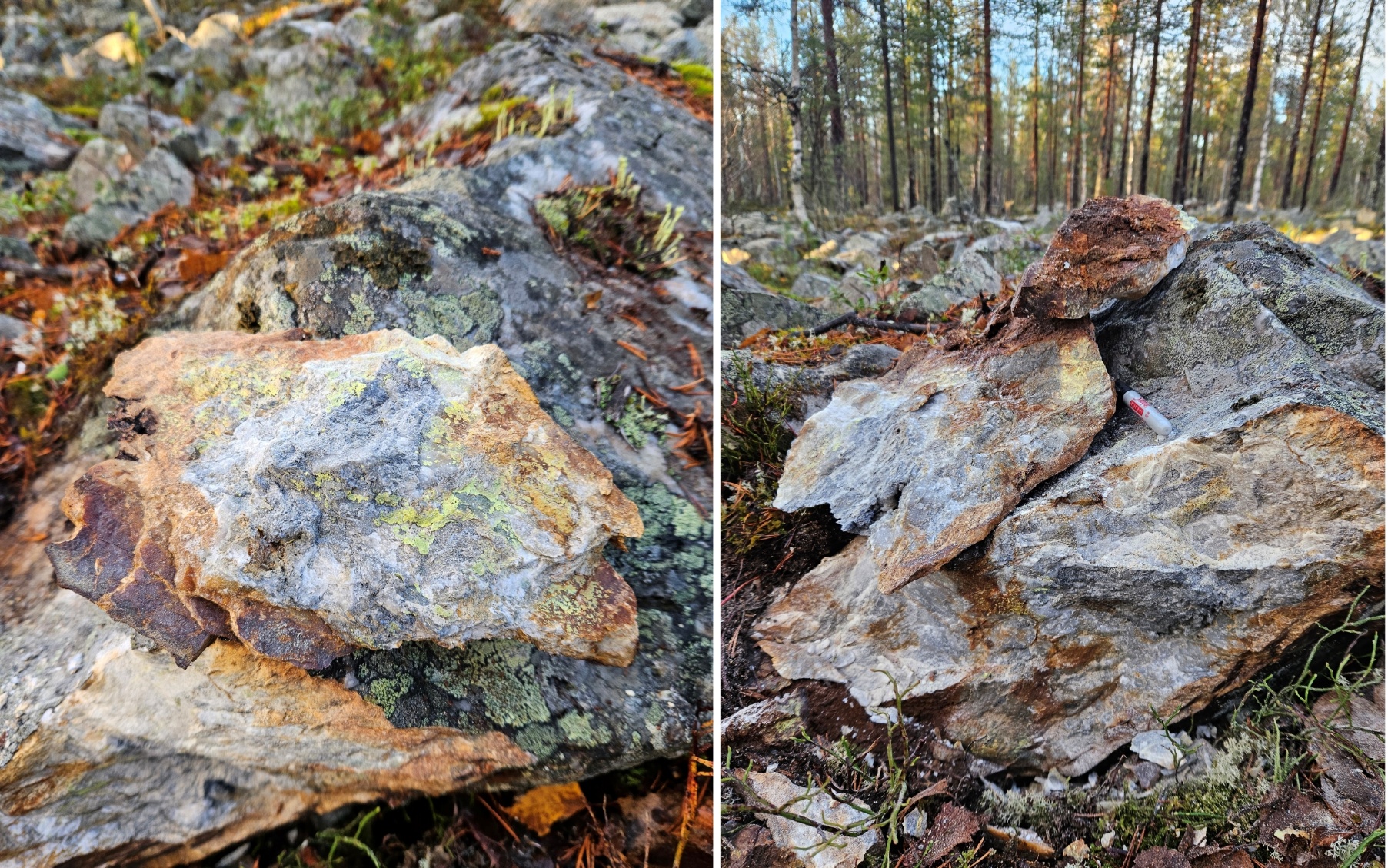FireFox Gold Expands the Mineralized Trend at the Jeesiö Project in Lapland, Finland - New Trench Reveals 14.62 g/t Gold over 2.84 metres at Undrilled Prospect
SODANKYLÄ, FINLAND – (December 11, 2024) – FireFox Gold Corp. (TSX.V: FFOX)(OTCQB: FFOXF)(“FireFox” or the “Company”) reports results from the fall exploration program at its 100%-held Jeesiö Project in Lapland, Finland. During the late summer and fall of 2024, the technical team focused on the southern end of the Jeesiö property, including the prospects KJ Hill, KJ South, and Saittavaara where rock sampling has repeatedly yielded encouraging results. The current program included limited scale trenching, mapping, and sampling. The trenching campaign at the KJ Hill prospect exposed a substantial zone of gold-mineralized quartz veins within a N-S striking deformation zone along the hillside. Channel samples collected from the vein zone graded 14.62 g/t gold over 2.84 metres, 2.69 g/t gold over 3.38 metres and 1.85 g/t gold over 1.69 metres.
Farther south on the same project, FireFox has expanded the size of the Saittavaara gold prospect with strong gold results from new surface sampling. The team followed the northwest trending magnetic-low corridor into zones of strongly sericite-altered and deformed quartzite with abundant iron oxide staining, which yielded gold values in rock samples of 3.16 g/t, 3.05 g/t, 2.61 g/t, and 2.57 g/t. This new gold-rich showing extends Saittavaara more than 800 metres from previous sampling to span a trend of more than 1.6 kilometres with significant gold showings.
Carl Lofberg, CEO, commented “There are now several significant gold occurrences over the large Jeesiö Project. In recent years, we have added detailed ground magnetics across the southern part of the property, and now we can see the relationship of these gold showings to the NE and NW striking faults, which are important in controlling gold in this part of Lapland. Our geologists have done great work to persist in their prospecting, and now we have collected numerous high-grade rock chips from KJ South up to the KJ Hill target – which are completely undrilled. The team has also expanded the Saittavaara showing another 800m north, well away from the very limited drilling we did there in 2021. These new targets are advancing Jeesiö upwards on our list of priorities.”
Jeesiö Project Program Details
The 100%-controlled Jeesiö Project covers approximately 71 km2 along one of the major trans-crustal structures that control the emplacement of numerous orogenic gold deposits in Lapland. The main Jeesiö targets include the Utsamo and Kataja Belt areas. From south to north, the Kataja Belt consists of three gold prospects: Saittavaara, Katajavaara South (KJ South) and Katajavaara Hill (KJ Hill) spanning at least 3 kilometres. These are apparently related to northeast-trending younger fault zones and to a major left-lateral fault zone that continues from these three prospects further towards northwest and southeast. The high-resolution airborne magnetics data reveal multiple generations of folding and faulting across the southern part of the property (Figure 1).
 Figure 1. Magnetics interpretation and target areas on Jeesiö property.
Figure 1. Magnetics interpretation and target areas on Jeesiö property.
The area of exploration trenching in 2024 is marked with black box.
KJ Hill
The 2024 exploration trenching campaign at Jeesiö was focused on the KJ Hill prospect, which is located approximately 900 metres to the north of KJ South along the trend of a N-S oriented magnetic feature. Along the eastern slope of the hill, there are fields of locally derived boulders displaying abundant mineralized quartz veins intruding metasedimentary (arkose and quartzite) and mafic igneous rocks. FireFox collected grab samples from surface boulders of these quartz veins in 2020, including one sample with 4.73 g/t Au (see Company news release datedOctober 6, 2020). This trend of anomalous samples is approximately 400 metres long and appears to be associated with a younger structure that crosscuts the north-trending magnetic anomaly in a northeasterly direction. This outcrop area was part of the 2022 exploration trenching campaign, which unearthed more narrow gold-bearing structures, including a high-grade quartz vein with 33.60 g/t Au from the KJ Hill prospect (see Company news release dated January 25, 2023). To improve understanding about the extent of the mineralized system, FireFox continued the trenching at this prospect in September 2024.
During the 2024 exploration trenching campaign at KJ Hill, the team excavated two NNE-SSW trending trenches. The first was 11 metres long and excavated parallel to the NNE-SSW trending fault zone. The exposed geology consisted mostly of strongly carbonatized mafic intrusive rocks, siliciclastic metasedimentary rocks, and quartz veins that contained disseminated pyrite, magnetite and goethite. Geologists collected two channel samples – one channel sample perpendicular and another sample parallel to the trench, and several grab samples. The channel sample cut perpendicular to the shear zone returned 0.59 g/t Au over 1.09 metres (Table 1).
Table 1. Highlights of the Kataja Hill assays with selected pathfinder elements. Bismuth (Bi) and Tellurium (Te) show positive correlation with the gold (Au) values in the area.

Figure 2. Map of quartz vein swarms and lenses in trench KT24-2.
Quartz veins can be seen to deflect in association with fault zones.
The second trench (KT24-2, Figure 2) was approximately 40 metres long and included several smaller side cuts. The lithology consists of siliciclastic metasedimentary rocks cut by quartz vein swarms and lenses. The contacts between the veins and metasediments sometimes contain traces of disseminated pyrite and magnetite with secondary goethite. The metasedimentary rocks are strongly schistose, the dominant fabric striking to the NNE. The vertical to subvertical quartz vein swarms usually strike northerly (NE to NNW), somewhat oblique to the schistosity. However, the veins occasionally deflect parallel to the schistosity planes, indicating strong right-lateral ductile deformation was likely present during or before the vein formation. The right-lateral fault zones shown on Figure 1 are likely related to the so-called D3 deformation event in Lapland; and these faults are concordant with local schistosity as evidenced by measurement of sub-horizontal slickensides on the deformed rocks.
FireFox geologists collected 19 channel samples from trench KT24-2, 15 of which were taken along the quartz vein swarms and four were perpendicular to the swarms and local rock fabric. The strongest results were from quartz vein samples, including 14.62 g/t Au from an individual 2.84 metre channel sample, 2.69 g/t Au from a 3.38 metre-wide channel sample, and 1.85 g/t Au from a 1.69 metre-wide channel sample. These results contribute to the widespread gold occurrences at the Katajavaara prospect, which remains undrilled and open in every direction.
The FireFox team believes that these narrow gold showings are expressions of structural leakage from a larger gold system that may be controlled by the major NW trending shear zone in Figure 1. As this major shear zone continues to the northwest, it intersects different lithology and hosts magnetic lows that now occupy topographic lowlands where swamps have formed.
Saittavaara Prospect
The FireFox team has now identified new targets from detailed ground magnetics surveys in the southern and southwestern parts of the Jeesiö project area, which correspond well with prospecting efforts in 2023 and 2024, as previously reported (see News Release dated February 22, 2024, and September 17, 2024). Previous mapping and sampling in this area highlighted a package of gold-mineralized highly-deformed quartz-rich metasedimentary rocks and a corresponding magnetic-low corridor. The magnetic feature strikes NW-SE and is interpreted to be cut by multiple faults. The dominant lithology at Saittavaara is quartzite, often showing signs of alteration with sericite and iron oxide (Figures 3 and 4).
Earlier sampling in the area was encouraging, including rock chip samples of 5.04 and 6.28 g/t gold. During the fall of 2024, geologists pushed this trend approximately 800 metres to the northwest from the previous occurrence by collecting 15 additional samples, which again yielded significant gold values including multiple samples over 2 g/t Au (Table 2). The geochemistry in this area is a bit different, as peak molybdenum (Mo) values reach almost 0.24% in these rocks. The association of high-grade gold with Mo, Bi, and Te has been noted at Mustajärvi and other of the Company’s projects.
Table 2. Highlights from the Saittavaara area gold occurrence. Coordinates presented in EPSG:3067.


Figure 3. New gold-rich grab samples on magnetic map of Saittavaara area.

Figure 4. Strongly deformed, oxidized and mineralized sericite quartzite outcrop; sampling returned 2.61 g/t gold and 0.24% Mo.
Methodology & Quality Assurance
Rock chip samples reported in this news release were collected by FireFox geologists, who transported the samples to the Company’s secure facility in Sodankylä. After documentation and insertion of quality assurance samples, the rock samples were delivered to an ALS sample prep lab in Sodankylä. The samples were then crushed to -2 mm, split and pulverized into 1kg pulps, before being shipped to the ALS facility in Rosia Montana, Romania for gold by fire assay of 50 gm aliquots with AAS finish (method Au-AA24). Samples assaying above 10 g/t gold are automatically re-assayed by a 50-gm fire assay with gravimetric finish (method Au-GRA22). At FireFox’s request, these overlimit assays were completed in triplicate in order to evaluate the homogeneity of the gold in the prepared samples. Other elements, altogether 48, were measured after four-acid digestion by ICP-AES and ICP-MS (method ME-MS61) at the ALS facility located in Loughrea, Ireland. ALS Laboratories is a leading international provider of assay and analytical data to the mining industry. All ALS geochemical hub laboratories, including the Irish facility, are accredited to ISO/IEC 17025:2017 for specific analytical procedures. The FireFox QA/QC program, which consists of insertion of certificated standard material and blanks by FireFox into the analytical batches, did not show deviations from recommended values.
Patrick Highsmith, Certified Professional Geologist (AIPG CPG # 11702) and director of the Company, is a qualified person as defined by National Instrument 43-101. Mr. Highsmith has helped prepare, reviewed, and approved the technical information in this news release.
About FireFox Gold Corp.
FireFox Gold Corp is listed on the TSX Venture Stock Exchange under the ticker symbol FFOX. FireFox also trades on the OTCQB Venture Market Exchange in the US under the ticker symbol FFOXF. The Company has been exploring for gold in Finland since 2017 where it holds a large portfolio of prospective ground.
Finland is one of the top mining investment jurisdictions in the world as indicated by its multiple top-10 rankings in recent Fraser Institute Surveys of Mining Companies. Having a strong mining law and long mining tradition, Finland remains underexplored for gold. Recent exploration results in the country have highlighted its prospectivity, and FireFox is proud to have a Finland based CEO and technical team.
For more information, please refer to the Company’s website and profile on the SEDAR website at www.sedar.com.
On behalf of the Board of Directors,
“Carl Löfberg”
Chief Executive Officer
CONTACT:
FireFox Gold Corp.
Email:
Telephone: +1-778-244-8439
Forward Looking Statements
The information herein contains forward looking statements that are subject to a number of known and unknown risks, uncertainties and other factors that may cause actual results to differ materially from those anticipated in our forward-looking statements. Factors that could cause such differences include changes in world commodity markets, equity markets, the extent of work stoppage and economic impacts that may result from illness, extreme weather, changes in government and changes to regulations affecting the mining industry.
Forward-looking statements in this release may include statements regarding: the intent to conduct additional drilling; the belief as to the location of the most prospective gold targets; the location of targets for future drill programs; and the current and future work program, including the extent and nature of exploration to be conducted in 2024. Although we believe the expectations reflected in our forward-looking statements are reasonable, results may vary.
The forward-looking statements contained herein represent the expectations of FireFox as of the date of dissemination and, accordingly, are subject to change after such date. Readers should not place undue importance on forward-looking statements and should not rely upon this information as of any other date. FireFox does not undertake to update this information at any particular time except as required in accordance with applicable laws.

